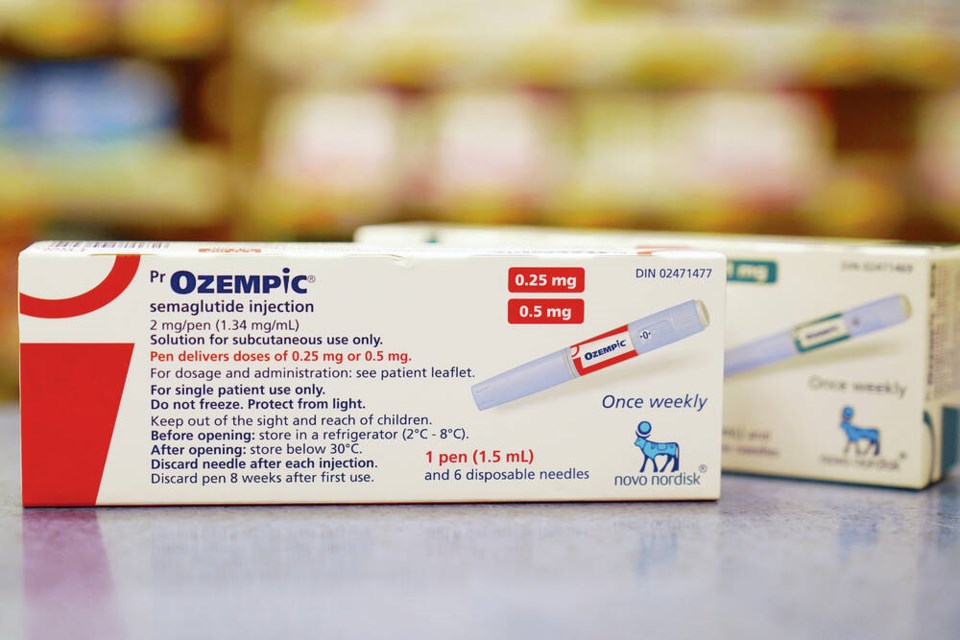Health Minister Adrian Dix tried Wednesday to shut down the questionable Internet pharmacy pipeline that funnelled a sizable quantity of the wonder drug Ozempic from two B.C. online pharmacies to U.S. customers by way of a Nova Scotia-registered doctor who lives in Texas.
Three weeks after blowing the whistle on the scheme, Dix signed a ministerial order that curbs the online sale of Ozempic to non-Canadians.
Barring some other workaround springing up, that will protect B.C.’s supply of the drug, which is designed to treat certain types of diabetes but has turned into a world-wide pharmaceutical phenomenon because it works for weight loss as well.
Hyped by celebrity endorsements of the off-label weight-loss benefits and a massive ad campaign, demand for the Danish-produced Ozempic grew so much that shortages developed in the U.S. and customers got online and turned to Canada, where the price is cheaper.
All that is needed is a Canadian doctor’s signature on the prescription, and at least one doctor was ready to cash in. Identified in media reports as Dr. David Davison, he’s a Nova Scotia-registered practitioner who works in Texas. For reasons that aren’t clear, thousands of his prescriptions were filled at two B.C. online pharmacies.
Two things brought the scheme to light. One was B.C.’s PharmaNet, the centralized data system that manages detailed information on every prescription filled in the province, which allows for quick, in-depth analysis.
The other was Dix himself. He said he has an “excessive” interest in prescription drug policy and watched the hype over Ozempic develop with close attention.
After he extended PharmaCare coverage for Ozempic in January for certain types of diabetes treatment, he asked staff to monitor PharmaNet data and quickly noticed the anomalies.
After just two months, they found 19 per cent (almost 13,000 prescriptions) were filled for U.S. citizens. That’s dozens of times the normal volume for other drugs.
Almost 90 per cent of them were filled at just two B.C. Internet pharmacies. Nearly all of them were written by the Nova Scotia registrant later identified as Davison.
He’s temporarily suspended and under investigation by Nova Scotia authorities, and the government has asked the B.C. College of Pharmacists to “review” the role of the B.C. dispensers.
The government has also asked medical colleges to ensure doctors and pharmacists are dispensing Ozempic for diabetes, not weight loss, and “are meeting clinical practice requirements.”
The situation cries out for federal intervention, even though provincial colleges regulate doctors and pharmacists.
Even before Ozempic, the cross-border pharmaceutical price differential created an online market for Canadian pharmacists filling various prescriptions for U.S. patients. Many Canadian drugs are cheaper because public health care systems buy in vast quantities and get discounts.
There is no shortage of Ozempic in B.C. now, but there could be if cross-border sales continued to grow. Dix said the bigger risk is that the producer “would not accept a situation where they’re sending us drugs so that we can undersell them in the American market.”
Prices would be jacked up and that could eventually apply across the board to many other drugs. The Ozempic situation could put the overall prescription-drug system in Canada at risk if nothing is done, said Dix.
“I don’t think there’s anything wrong with dispensing on the Internet, if all the rules are followed. But sending tens of thousands of doses to the U.S.? That doesn’t make sense.”
Dix said federal Health Minister Jean Yves Duclos is extremely supportive of B.C.’s stand and “has strong views about what has been going on in the case of this doctor and these circumstances.”
“We did not bring Ozempic to B.C. for it to be re-exported to the U.S. in response to whatever advertising campaigns may be put in place or word-of-mouth discussions.”
B.C. has closed that down, but Dix said: “You don’t want to be playing whack a mole where they find a pharmacy that can do this in another jurisdiction.”
The U.S. market is distorting Canadian health care, he said. The ban on selling to the U.S. imposed Wednesday is one way to counter it.
Dix looks ready to do it for other drugs, if needed. But a federal move would be more effective.



